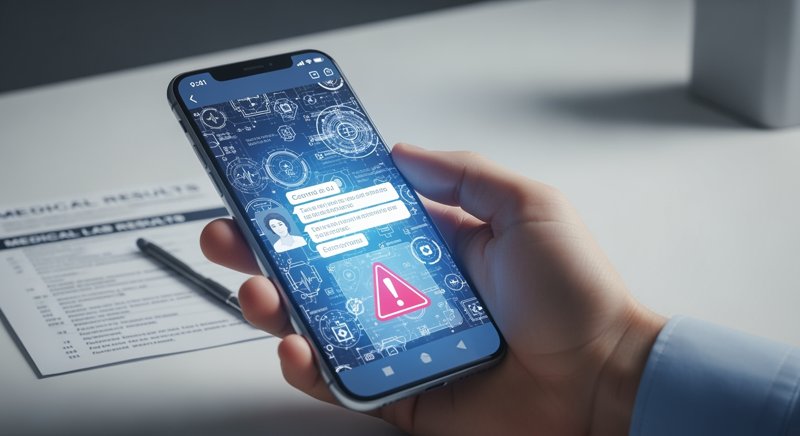🤖 Why Wizey Beats ChatGPT for Lab Interpretation: A Guide to Specialized Medical AI

It’s a tempting modern ritual: you get a PDF of your bloodwork, copy the confusing numbers, and paste them into ChatGPT with the simple, urgent question, “What’s wrong with me?” It’s fast, free, and feels futuristic. But when it comes to your health, the difference between a generalist AI and a medical-grade specialist is not just significant—it’s critical.
Large Language Models (LLMs) like ChatGPT are marvels of engineering, but they are not medical devices. Understanding why a specialized tool like Wizey is the superior choice for lab interpretation is the first step to becoming a truly empowered, digitally-savvy patient.
1. The Specialist vs. The Erudite Generalist
An LLM’s knowledge is a mile wide and an inch deep. It has “read” a vast portion of the internet, from peer-reviewed papers to Reddit threads. It can brilliantly associate “high cholesterol” with “heart disease risk” because it has seen those words together millions of times.
A specialized medical AI like Wizey, however, is built on a completely different foundation: a medical knowledge graph. This is not a flat sea of text; it’s a structured, multi-dimensional map of medical reality. It encodes the complex, causal relationships between diseases, symptoms, lab markers, and genetic predispositions, all curated and validated by medical experts.
- ChatGPT sees a statistical correlation.
- Wizey understands a physiological pathway.
This allows Wizey to identify subtle, multi-marker patterns that a generalist LLM, lacking a true causal understanding, would almost certainly miss.
2. The Peril of “Artificial Hallucination”
LLMs are designed to be plausible, not truthful. Their goal is to predict the next most likely word in a sequence. This can lead them to generate confident, fluent, and completely false statements, a phenomenon known as “hallucination.” In a creative writing exercise, this is a feature. In a medical context, it’s a critical failure.
Even with the rapid improvements in LLM reasoning seen in late 2025 and early 2026, the fundamental hallucination problem persists in medical contexts where precision is non-negotiable. Studies have shown LLMs fabricating medical references, misinterpreting clinical guidelines, and making diagnostic leaps that are statistically plausible but clinically absurd. This can lead to two dangerous outcomes:
- False Alarms: A benign, temporary fluctuation in a lab value is misinterpreted as a sign of a rare, terrifying disease, causing unnecessary panic.
- False Reassurance: A subtle but significant trend is dismissed as “within normal variation,” causing a crucial window for early intervention to be missed.
Wizey is built on a principle of explainable AI (XAI). It does not generate text based on probability; it follows a logical, evidence-based pathway through its knowledge graph. It shows its work, allowing you and your doctor to see the clinical reasoning behind its insights.
3. The Power of Context and Longitudinal Data
A doctor never interprets a lab result in isolation. They synthesize it with your symptoms, your medical history, your medications, and, most importantly, the trend over time.
ChatGPT is fundamentally stateless. Each query is a new, context-free event. It cannot see that your “normal” HbA1c has been steadily climbing for the past three years, a critical sign of developing insulin resistance.
Wizey is designed for longitudinal analysis. By tracking your biomarkers over time, it can identify the subtle, slow-moving trends that are often the most important indicators of your long-term health trajectory. It sees the whole movie, not just a single, isolated frame.
4. The Fortress of Medical-Grade Security
When you paste your health data into a public chatbot, you are sending sensitive personal information to a non-medical, commercial entity. The privacy policies are often designed for general consumer use, not for the strict standards of healthcare.
Wizey is engineered from the ground up as a secure, medical-grade platform. It operates under the same principles of data privacy and security as a hospital’s electronic health record system, ensuring your most personal information is protected.
5. The Last Mile: From Information to Action
Perhaps the biggest difference is the final output. ChatGPT, even when it provides accurate information, will almost always end with the generic, unhelpful advice to “consult a doctor.”
Wizey is designed to bridge the gap between data and a productive clinical conversation. Its goal is to provide you with:
- Prioritized Concerns: Highlighting the one or two patterns that truly warrant discussion.
- Specialist Guidance: Suggesting whether a conversation with a cardiologist, endocrinologist, or general practitioner is the most logical next step.
- Actionable Questions: Providing a list of smart, specific questions to ask your doctor to get the most out of your appointment.
The Bottom Line
General-purpose AIs are a revolutionary technology. But your health is not a general-purpose problem. It is a specific, high-stakes, and deeply personal domain that demands a specialized tool.
Recent research confirms this distinction: a 2024 Nature Medicine study found that large language models generated plausible but medically incorrect recommendations in 8-15% of cases, with errors most common in nuanced clinical situations. Meanwhile, specialized AI systems trained on validated clinical data achieved 74.3% diagnostic accuracy with 100% sensitivity for emergency safety cases (JMIR Medical Informatics, 2024).
Using ChatGPT for lab interpretation is a gamble. Using a purpose-built, clinically-validated tool like Wizey is a strategy. It’s a conscious choice to engage with your health data in a way that is safe, structured, and, above all, smart.
Explore More: Learn about the fundamental architectural differences between general AI and medical AI, or see a detailed comparison of Wizey vs ChatGPT with real-world examples and performance metrics.





